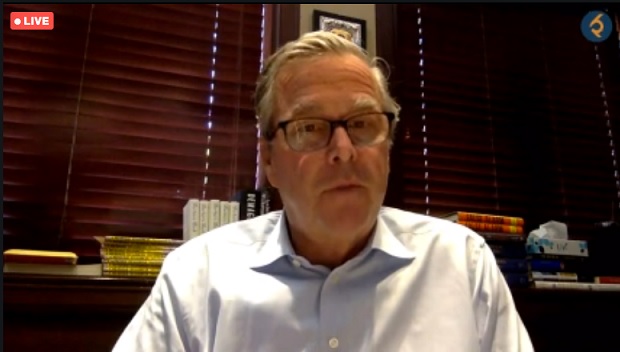 During his keynote, Bush highlighted many of the struggles currently facing our country, and how the COVID-19 pandemic has only amplified them.
During his keynote, Bush highlighted many of the struggles currently facing our country, and how the COVID-19 pandemic has only amplified them.
With finger-pointing and name-calling the norm among politicians and even in everyday conversations, few people would relish the idea of spending an hour listening to someone share his thoughts on the political outlook of our country. But for attendees of the 16th annual BenefitsPRO Broker Expo, the opening keynote address from former Florida governor Jeb Bush offered a welcome change of pace: a call for optimism, bipartisanship, innovation and creativity.
"There's a lot of things that liberals and conservatives can agree on, but they need to pause, agree and take action," Bush told a virtual audience of attendees. "When they find common ground on a subject, embrace it. The center has been torn asunder in our country and we need to rebuild it."
Recommended For You
Regardless of the outcome of the November election, politicians have their work cut out for them. During his keynote, Bush highlighted many of the struggles currently facing our country, and how the COVID-19 pandemic has only amplified them. "No one would have ever expected this," Bush said. "It has shaken our country to the core. The impact of this goes way beyond the presidential election."
There are two areas in particular that Bush sees as being particularly vulnerable to the effects of the pandemic: education and health care.
"Education is perhaps the single most important thing to get right for us to have any hope of recovery," Bush said, noting the impact being out of school has and will continue to have not only on children's social development but their mental health, as well.
While Bush applauded the creative approaches schools have been adopting to bring students back to the classroom, either in person or virtually, it also highlights another key issue faced by our country today, one disproportionately affecting low-income communities: the digital divide. "Irrespective of whether schools open, it should be a national priority to provide broadband to every American," he said. "The home is becoming not just a place to gather and rest, but a place where business takes place, where learning takes place."
Bush sees the home environment seeing renewed importance, not just for work and education, but health care, as well, as tech innovations offer more opportunities for older adults to remain in the comfort of their own homes and home-based health models aim to meet the patient where they are.
All of this presents another challenge, Bush warned. "It's very easy to live life in the bubble now," he said. "You can be more productive, but the lack of connection, the lack of empathy for the plight of those who don't have that privilege is a serious problem that could play out in the streets in the coming year."
Our governments and political leaders need to prepare for this scenario, he says, through job training programs and investing in broadband access to underserved communities. But it will be up to our political leaders to come together in agreement to get things done.
"Here's what I hope happens; after this hyper-political election, we move back to trying to find consensus on things that we agree on," Bush said. "We need solutions to significant problems, and we need presidential leadership that gives people a sense that we're all in it together. Not much of politics is inspiring hopeful or optimistic these days, but we need to get back to that. Our democracy depends on it."
As for health care, the country has been "resting on its laurels" for too long, Bush said. Beyond our current lack of preparedness to address the coronavirus pandemic, our current system represents a national security threat, with acts of bioterrorism capable of sparking new and worse pandemics in the future.
"We need to make sure we have a repository of PPE, contract tracing, testing far better than what we have done today," he said. "This is an example of the U.S. resting on its laurels at a time when we should be constantly renewing ourselves."
Further, this lack of innovation is at the heart of our national health care reform debate, and if the free market doesn't step up and offer some solutions, then the only alternative will be a government-run health system.
"Those that believe in markets and choice and patient responsibility haven't been offering creative 21st-century suggestions," he said. "Businesses are going to have to play a more constructive role. My hope is that the creative solutions will lead the way to get back to a patient-centered health care system that is focused as much on preventing disease as reacting to it.
"It's extraordinarily important for businesses to stay involved in this," he emphasized. "The price that the private sector will pay to move to a completely government-run system will far exceed what they're paying now."
Despite the dreary outlook we're facing, Bush continued to offer a positive vision of our nation's future. "There hasn't been someone extracting that unique American ability to innovate, to take risks, to not fear the unknown but embrace it," he said. "That's the Elon Musk spirit. That's the kid selling lemonade on the street corner to raise money for the food bank. There are thousands of those stories all around us. We forget that there are acts of kindness, ingenuity, happening all around us. We need to be more mindful of those things."

